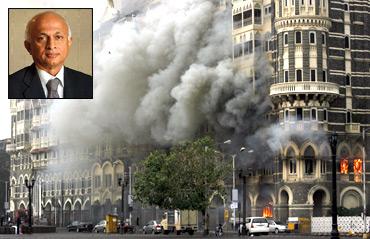
Talking about security dimensions of India's foreign policy, Foreign Secretary Ranjan Mathai said in a recent address at the National Defence College that India's vision of peaceful, cooperative and progressive South Asia cannot be realised unless the dark shadow of terrorism emanating from Pakistan is eliminated. At the same time, he also emphasised the need to ensure that our smaller neighbours are not used by elements inimical to our interests.
I was originally given the theme -- India's Foreign Policy Concerns and Strategy -- but in the Ministry of External Affairs, I was advised to restrict the talk to the theme of your current study, which is Strategies and Structures for National Security. The theme of foreign policy is larger and involves many different strands. In the kind of opening statement which I am making, it is better to touch on broader themes and leave other aspects to a Q&A session if they are felt necessary. Now, I was last here in 1987 and hence I know that I have been lucky with the timing. So let me go to the subject.
India's external environment remains complex and challenging. We are living in a world in transition, not just in geo-political terms, but also in geo-economic terms -- covering trade, financial flows, financial trends, demographic changes and participation in a globalised economy. Globalisation comes with its concurrent global threats -- terrorism, proliferation of weapons of mass destruction, piracy and other threats to maritime security, environmental challenges, threats to space and cyber security, and access to water, among others. It is hard to distinguish between traditional and non-traditional threats to security, just as the lines are getting blurred between threats that emanate from within, our immediate neighbourhood or from regions far beyond our own. Let me now start with a few basic parameters.
As the prime minister said at the recent Combined Commanders Conference, our internal and external policies must factor in the deterioration in the international strategic and political environment. The ability of the international community (such as it is) to respond to global security challenges has been limited by the preoccupation of major powers with domestic problems. 2012 will be a year of political transitions.
Our foreign and security policy guidelines flow out from the national requirements of sustained and inclusive economic growth, which are politically defined as the priority for the country. External engagement has to ensure an enabling environment for national growth and development in terms of securing key variables: a periphery which is peaceful and hence permits concentration on economic development and access to material resources, energy, technologies and access to markets.
...

In a globalised world, a proactive external engagement is required to protect and promote India's national interests. We need to define strategic autonomy in a dynamic context. From a foreign policy perspective it means that we must be self reliant in sectors critical to our national security, but we should be able to use external sources to our advantage.
This will require that export control regimes targeted against us are given up. Beyond the critical sectors we must actively seek participation in global networks so that we benefit from sources with comparative advantage. It is of course clear that the ability of a country to harness globalisation to its benefit depends on its own strengths -- which broadly includes the strength of its institutions, its infrastructure, its military capabilities, economic dynamism and cultural vitality.
Our strategic and security interests and concerns are closely intertwined with those of our neighbours. The peaceful periphery I talked of earlier calls for a policy of active engagement and cooperation with these countries with a view to nurture and promote our shared destinies and expand economic complementarities and connectivity. This is an ongoing effort.
We seek to ensure that our smaller neighbours are not used by elements inimical to our interests. Conversely, our neighbours have to be assured their interests are taken care of in our bilateral engagements. Giving our neighbours a stake in our own economic growth will be an investment in our shared vision of security through shared prosperity. With many of our neighbours we are also committed to assisting them in building up their own security capabilities -- through training, service-to-service ties, joint exercises etc.
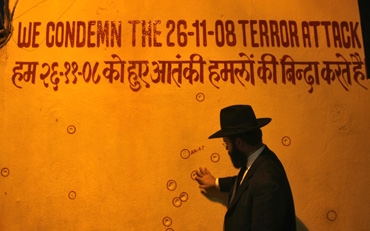
At the bilateral level, we desire peaceful and cooperative relations with Pakistan. We are committed to resolving all outstanding issues with Pakistan through bilateral dialogue in an atmosphere free from terror and violence. The first round of the resumed dialogue has been completed in July 2011. We are committed to carry forward our discussions with an open mind and a forward-looking approach. However, Pakistan must fulfill, in letter and spirit, its stated commitment of not allowing territory under its control to be used for fomenting terrorism against India in any manner. Our vision of a peaceful, cooperative and progressive South Asia cannot be realised unless the dark shadow of terrorism emanating from Pakistan is eliminated.
We have a strong multi-faceted strategic relationship with Afghanistan, demonstrated by the Strategic Partnership Agreement signed during the recent visit of President Karzai to India. Our strategic relations are based on historical and cultural linkages, and cemented by a significant Indian role in the reconstruction, development and capacity-building in Afghanistan.
It is in our interest to see a peaceful and stable Afghanistan, which develops its natural and human resources and also becomes an economic hub, linking Central and South Asia through pipelines, trade and transit routes for the common good of the people of our region and the world. In this regard, India has committed to assisting Afghanistan in its reconstruction and development process in the run up to 2014 and beyond.
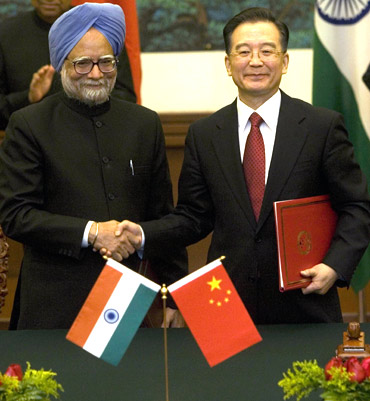
India and China as two large, growing economies with overlapping areas of interests are bound to cooperate and compete simultaneously. On the global issues there are a number of areas where we find common ground. The nature and content of the bilateral relationship has evolved considerably since the signing of our Strategic and Cooperative Partnership for Peace and Prosperity and the Shared Vision Document in January 2008. We have a wide-ranging bilateral dialogue.
We also have outstanding issues and discussions by the special representatives appointed to deal with the boundary question are set to continue. The rapid strides in economic and military capabilities of China and the manner in which China exercises its power is being followed carefully not only by us but by other neighbours in East Asia, Association of Southeast Asian Nations and beyond. Managing our relations with China, will be probably the most critical element among the security dimensions of India's foreign policy.
India shares open borders with Bhutan and Nepal. Open borders have facilitated people-to-people contacts and trade and commerce but they are vulnerable to misuse by forces inimical to peace and stability in the region. The security challenges posed by open borders require more intense and effective coordination between the security agencies of our two countries.
We are working with Nepal's law enforcement agencies to address issues such as money laundering, and financing of terrorism through mutual cooperation. The need to further strengthen cooperation at the operational levels, ensure better coordination and exchange of information cannot be over emphasised.
Our relations with Bhutan, whose Head of State visited India last month, are based on trust and mutual understanding, which has been sustained through a common perception and understanding of our strategic and security interests. The operations conducted in 2003 to evict Indian Insurgent Groups in Bhutan were a milestone in our joint response to terrorist activities. India is committed towards capacity-building in Bhutan's security agencies and there is close cooperation in the training of Bhutanese police and armed forces personnel in training institutions in India. The Indian Military Training Team in Bhutan is a symbol of our cooperation in the defence and security field for over four decades.

During PM's visit to Dhaka in September, we made significant strides in our relations with Bangladesh, including the settlement of the long pending land boundary issues, and trade and economic cooperation. We expect to move forward on water sharing issues and road, rail and waterways connectivity which will fundamentally transform the cooperative landscape between India and Bangladesh.
On security related matters we have received very good cooperation from Bangladesh and have been reassured that Bangladesh soil will not be allowed to be used for any activity inimical to our security interests.
India enjoys close and friendly relations with Sri Lanka and the Maldives which covers wide range of areas including trade, connectivity, power, agriculture, science and technology, capacity building, infrastructure development, education, culture and people to people contacts. We have close military-to-military cooperation with these neighbouring countries that underpins our core security concerns.
There have been recent exchanges of visits at the level of the three Service Chiefs, senior officers, institutional exchanges and training programmes. More such exchanges and visits contribute to better bilateral understanding. Our relations with Myanmar continue to have a strong security dimension. The stabilisation of our borders in the North-East of India requires a policy of cooperation with Myanmar. Myanmar can be our land bridge to South East Asia. It is also a significant partner in the Bay of Bengal.
Our extended neighbourhood in South East Asia, Central Asia and the Gulf region are an important priority in our foreign policy. These are regions that are witnessing domestic transformations, which could impact on vital interests, including the presence of a large Indian Diaspora and as a source for our growing energy needs. Our strong economic and trade relations with these regions will need to grow in the coming decades. Hence their peace and stability is of vital interest to us.
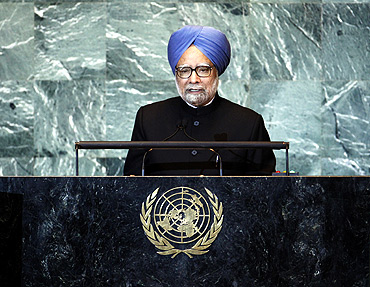
The entire Indian Ocean region stretching from East African coast to the South China Sea remains crucial to our foreign trade, energy and national security interests. As part of our 'Look East' policy, the engagement with South East Asian states has been intensified. The Asia Pacific region is witnessing evolution of a regional economic and security architecture.
We are participating in the process of East Asia Summit, ASEAN Regional Forum, ADMM Plus and other forums. An open, balanced and inclusive regional architecture is in the long-term interest of the region as a whole. Our strategic partnerships with Japan, ROK and other Asia Pacific countries also serve our long-term economic, developmental and security interests.
As part of our expanding interests, our relations with major powers are becoming increasingly important and extend beyond purely bilateral cooperation to areas such as regional security, economic issues, climate change, and disarmament and non-proliferation. We have established over the last decade a close relationship with the US and the US President last year described our relationship as one of the defining partnerships of the 21st century. Our ties with Russia also remain of vital importance to us -- and this is underlined by the leadership level summits held annually with Russia. With Japan, France, and United Kingdom too we have very close ties founded on a commonality of interests encompassing the political, defence, energy, and economic areas.
With all these countries we have to leverage our relations in high technology cooperation that can boost our defence modernisation programmes. This engagement is also important for securing a place for India in the world that is commensurate with our position and our expectations. Our current two-year membership in the United Nations Security Council and constructive contribution in international forums also reinforces our global credentials.
In an increasingly integrated global economic order, the economic crisis in some European Union states affects the rest of the world through financial, trade and investment linkages. The G-20 had demonstrated its value in jointly addressing the challenges of the financial and economic crises and initiating reforms in international financial institutions. It remains a key forum for us to ensure that the agenda of the international economic cooperation takes account of our concerns and those of other developing countries.
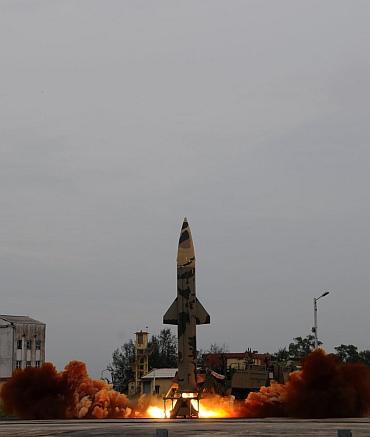
Through new formations like Brazil, Russia, India And China, and India, Brazil, South Africa we are expanding our economic partnerships with what are called the emerging countries.
We share the long-term vision for global, non-discriminatory and verifiable nuclear disarmament. We also support global non-proliferation objectives. However, as a nuclear weapon state, nuclear weapons are an integral part of our national security and will remain so pending global elimination of nuclear weapons.
The government is committed to putting in place all the necessary capabilities in pursuit of our policy of credible minimum deterrent. The developments in Pakistan's nuclear and missile programmes have been reported widely. The close military and strategic ties between China and Pakistan impacts on our security environment.
Our policies and engagements need to factor in this strategic realty and provide us options and additionalities to safeguard our national interest, beyond our own efforts.

India's position in the Indian Ocean gives our nation a maritime destiny. Our foreign policy has to address growing maritime challenges which call for comprehensive naval capabilities. Ninety per cent of India's international trade by volume and 77 per cent by value is carried by sea. The maritime dimension is also vital for our energy security, as economic growth is critically dependent upon unhindered flow of oil.
The sea-borne terrorist attacks on Mumbai-26/11, focussed the need for strengthening maritime and coastal security against threats from sea. The growing threat of piracy emanating from Somalia has assumed ever-expanding dimensions even coming relatively close to our Lakshadweep island territories.
A flexible but proactive maritime doctrine is essential to safeguard and project our national interests overseas as a net security provider to several island and littoral states in the Indian Ocean region and beyond. Obviously, this doctrine has to mesh with our overall foreign policy outreach. I am happy that as I speak, the ministerial meeting of the Indian Ocean Rim Association for Regional Cooperation is being held in Bengaluru. The Indian Ocean Naval Symposium and the joint exercises carried out with partners are also of significance in this context.
Let me say in conclusion that our armed forces are increasingly participating in our external engagement which extend beyond United Nations peace-keeping, goodwill visits or joint exercises. Bilateral defence talks and service-to-service interactions have been growing. The services are integral to participation in the Regional Cooperation Agreement on Combating Piracy and armed robbery against Ships in Asia, Defence Officials Dialogue under the ASEAN Regional Forum and the ASEAN Defence Ministers Meeting Plus process.
We live in a world in transition to a new order which will not be just multi-polar but one with kaleidoscopic arrangements based on varying security, economic, technological and societal interests. This will call for greater coordination in our policy-making mechanisms at home. The distinctions between internal and external security will also become more blurred calling for a constant review of our capabilities, preparedness and strategies. This NDC course is, therefore, an important opportunity to address the strategies and structure for our national security.